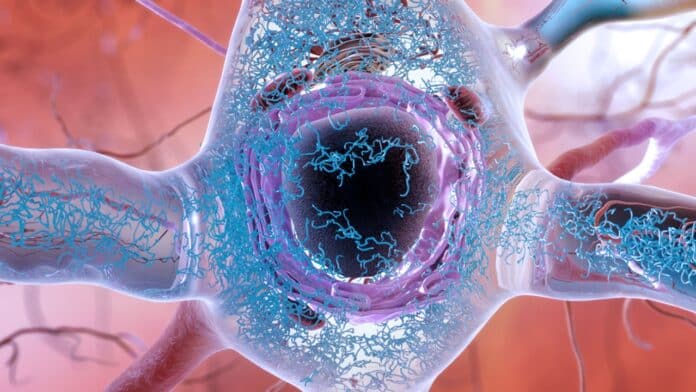In diseases like Alzheimer’s and Parkinson’s, proteins clump up in the brain, which researchers thought was killing brain cells. They tried to find treatments to remove these clumps but didn’t succeed much. Now, researchers at the University of California, Berkeley, have discovered something new. They say it’s not the clumped proteins killing cells but the cells’ stress response not turning off.
In a recent study published online in Nature on Jan. 31, researchers found that using a drug to stop the stress response can help save cells that imitate early-onset dementia. Lead researcher Michael Rapé suggests that this discovery might give doctors another treatment option for certain neurodegenerative diseases caused by protein mutations that control the stress response.
These diseases include those leading to ataxia (loss of muscle control) and early-onset dementia. Rapé also mentioned that similar stress responses are found in other neurodegenerative diseases like Mohr–Tranebjærg syndrome, childhood ataxia, and Leigh syndrome, which share symptoms with the early-onset dementia studied.
Rapé, head of the new division of molecular therapeutics in UC Berkeley’s Department of Molecular and Cell Biology and a Howard Hughes Medical Institute investigator, said, “We always thought that protein clumps directly kill neurons, for example, by puncturing membrane structures within these cells. Yet, we found that aggregates prevent the silencing of a stress response that cells originally mount to cope with bad proteins. The stress response is always on, and that’s what kills the cells.”
“We think that the same mechanisms may underlie more common pathologies that also show widespread aggregation, such as Alzheimer’s disease or frontotemporal dementia, but more work is needed to investigate the role of stress signaling in these diseases.” He added.
Rapé’s lab made an important discovery: brain cells must stop their stress response after solving a challenging problem. Rapé explained it like this to his son: Just like cleaning your room and turning off the light before bed. If you leave the light on, you can’t sleep. But if you turn it off before cleaning, you might trip in the dark. Similarly, a cell must clear protein clumps before stopping stress. If it doesn’t, the cell will die.
According to researchers, it could die if a cell doesn’t clean up protein clumps and turn off stress signals. Rapé compared it to leaving a light on in a room—it doesn’t directly harm but prevents sleep. So, treating neurodegenerative diseases might not need to remove the clumps entirely but instead turn off the stress signals.
Rapé’s team discovered a complex called SIFI, which cleans up clumps and stops stress signals. When clusters are present, SIFI diverts from stopping stress, leading to cell death. Treatment might involve drugs to stop stress signals and keep SIFI active to clean up clumps.
Rapé, the Dr. K. Peter Hirth Chair of Cancer Biology at UC Berkeley, studies ubiquitin, which helps break down other proteins in the body. In 2017, he discovered that a protein called UBR4 helps tag proteins for elimination, preventing them from clumping together inside cells.
Later, it was found that mutations in UBR4 are linked to some inherited neurodegenerative diseases. Rapé and his team then discovered that UBR4 is part of a larger complex called SIFI, which helps prevent protein clumping when cells can’t sort proteins properly. This clumping is associated with neurodegeneration.
Researchers were surprised to find that the main targets of the SIFI complex are two proteins. One of them senses when proteins can’t enter mitochondria, signaling a problem. It activates a kinase, an enzyme that regulates cell activities, to pause new protein production and fix the issue. SIFI also breaks down this kinase. By degrading these proteins, SIFI stops the stress response caused by clumpy proteins in the wrong place.
Rapé explained, “this is the first time an enzyme mutated in neurodegeneration has been seen actively turning off a stress response.”
The researchers discovered that SIFI recognizes a specific protein segment, like a ZIP code, which allows proteins to enter mitochondria. When proteins can’t enter, they build up, but SIFI targets and removes them using this “ZIP code” signal, like turning off a light switch when the room is clean.
Rapé explained, “When proteins clump inside the cell, it’s like leaving a light on all the time. The cell’s cleaning system, SIFI, gets stuck trying to clean up the mess instead of turning off the light. So, if there’s always a mess, the light stays on, and the cell dies.”
According to Rape, many protein clumps in neurodegenerative diseases might stop the cell from stopping its stress response. If so, a drug that blocks this response and saves brain cells could help treat many neurodegenerative diseases.
Another drug, ISRIB, discovered in 2013, has already been shown to improve memory in mice and reduce cognitive decline by stopping stress responses.
Rapé said “that by using drugs to turn off the stress response, we might be able to treat various neurodegenerative diseases. This could change how we approach these diseases and offer hope for patients.”
Journal reference:
- Haakonsen, D.L., Heider, M., Ingersoll, A.J. et al. Stress response silencing by an E3 ligase mutated in neurodegeneration. Nature. DOI: 10.1038/s41586-023-06985-7.
